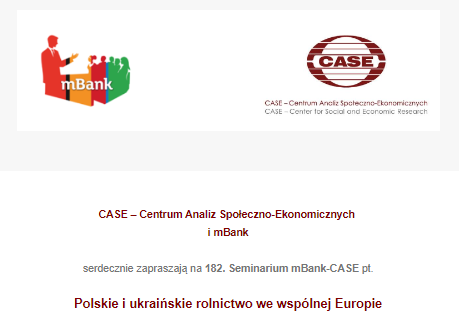About the Seminar:
Ukraine’s accession to the European Union is an inevitable and necessary process from a geopolitical perspective. As a result, integrating Ukraine’s agricultural sector into the European single market becomes one of the major challenges for both the current and future EU Common Agricultural Policy (CAP). During the seminar, we will discuss the challenges associated with Ukraine’s accession to the EU and the integration of its agrarian economy with Europe’s, as well as the future of Polish agriculture.
Key aspects to be addressed include:
- Natural conditions (soil quality and fertility),
- Structural conditions (size of the sector and farm structure in Ukraine and EU countries, production efficiency),
- Regulatory conditions (production standards and agricultural support systems), and finally,
- Socio-political conditions (the sector’s role in rural development and managing its environmental and climate impact).
The task of smoothly integrating Ukrainian agriculture with the European system coincides with the ongoing challenges of ensuring food security in the face of (a) climate change, (b) geopolitical crises, and (c) social disruptions that affect both food production and the functioning of supply chains.
Ukraine’s accession to the EU will increase the EU’s agricultural area by one-quarter, while also enhancing the strategic autonomy of the European Union. It will create trade opportunities for Ukraine’s 35 million inhabitants, not only in terms of technology and know-how but also regarding market access for agriculture. Continuous support for farmers in the EU will be necessary, considering budgetary constraints and the repercussions of the conflict in Ukraine. The CAP budget will need to increase to support these objectives, alongside new financial instruments tailored to specific needs.
The complexity of the integration process and the strategic considerations related to EU enlargement underscore the importance of preparation for integration, ensuring sustainable development and support for the agricultural sectors and rural areas in both current EU member states and Ukraine.
Given this European challenge and the undeniable competitive advantage of Ukraine’s agricultural sector, regulatory and investment actions must be taken in Poland to boost the productivity and competitiveness of Polish agriculture and food processing. Additionally, Poland must capitalize on access to large quantities of cheaper agricultural raw materials. At the same time, it is essential to expand the infrastructure needed to efficiently receive and transit Ukrainian agricultural raw materials and products to the entire Single Market and third-country markets. These actions, most of which require time, should be initiated immediately.
 Homepage CASE
Homepage CASE

